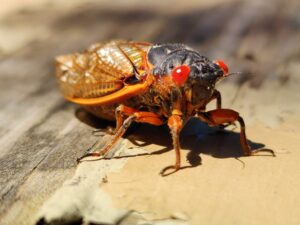The emergence of the Great Eastern Brood of cicadas for the first time in 17 years has swept popular culture in the U.S., but how much do you know about them and what does it mean for us here in Northeast Florida?
The Great Eastern Brood of Cicadas are also known as 17-year cicadas or periodical cicadas. They are easily identifiable by their red-and-black color and typically are about an inch long and have wings. 17-year cicadas emerge when the ground reaches 64 degrees Fahrenheit every 17 years with the purpose of mating. Thankfully, cicadas are not a threat to people or pets. They do not bite or sting, are not venomous nor will they infest your house. The only damage they do cause is to young trees during their egg-laying process.
Depending on where you live, the swarm may take over your entire yard, patio, deck or other outdoor space. If the cicadas are oppressive in your area, the best thing you can do is just stay inside or use screened-in outdoor areas instead. You should discourage your dog from eating them as their hard exoskeletons can be difficult for animals to digest. Eating too many of them can cause an upset stomach, abdominal pain, vomiting and other complications that may require a trip to the vet.
The Great Eastern Brood of cicadas emerging this year are not expected to make it to Jacksonville, but they are expected to be found Delaware, Illinois, Indiana, Kentucky, Maryland, Michigan, New Jersey, New York, North Carolina, Ohio, Pennsylvania, Tennessee, Virginia, West Virginia, Washington D.C. and as far south as Georgia. While the Great Eastern Brood is not expected to make its way to North Florida, there are over 3,000 known species of cicada, and Florida has 19 of those species within state-lines.
Cicadas are not dangerous or anything to be alarmed about, unlike fire ants, mosquitos and other pests that Russell Pest Solutions can help manage. Regardless of the threat, Russell Pest Solutions is always ready to help you prepare for the unexpected and educate the North Florida community on pest solutions. Questions? Interested in learning more or scheduling an inspection? Call us now at 904-868-7378.

Recent Comments